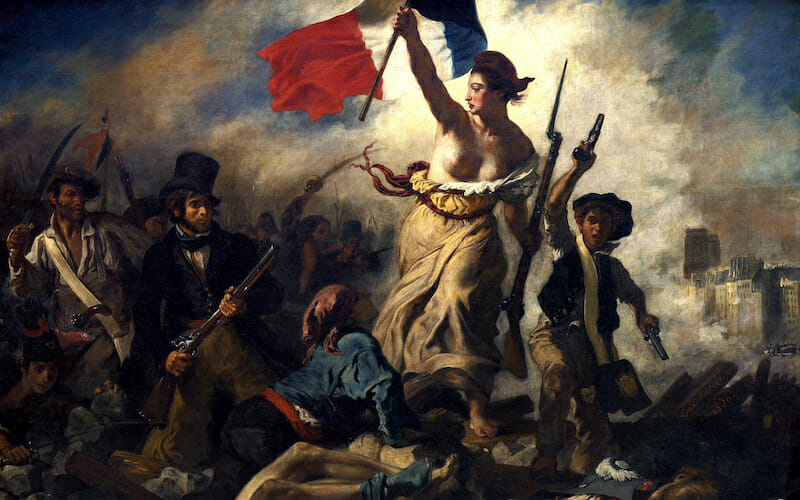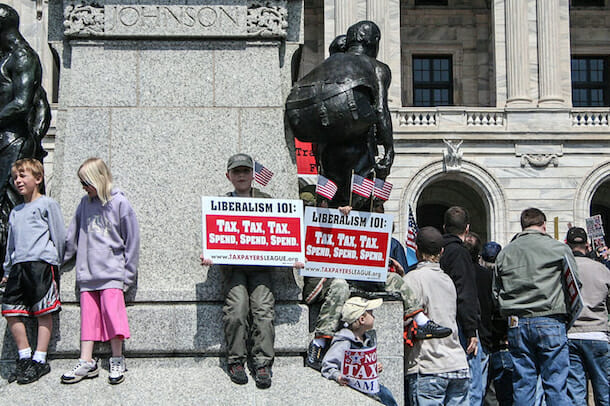
Why Liberalism Is in Decline
Liberalism is in decline. For close to two centuries liberalism has been a major force that has in many ways shaped the course of human history. When communism collapsed in 1991 the influence of liberalism seemed to have reached its peak. It became a truly global phenomenon. Even countries that had not been traditionally in the sphere of Western influence, such as Russia or China, adopted wholesale the liberal socio-political practice. The success of liberalism was indisputable. There just did not seem to be any alternative to liberalism. Many believed that human history had reached its end and liberalism was this end, as Francis Fukuyama triumphantly proclaimed in his famous book The End of History and the Last Man.
However, no sooner had liberalism achieved its unprecedented success as its influence both around the world and even in the West it began to decline. Today liberalism faces a very uncertain future, as the threat of revived nationalism, populism, and tribalism is on the rise. Why is liberalism that has been in ascendency for so long, losing its position and influence in the world?
Liberalism rests on two pillars. One pillar is freedom of the individual. Liberals hold this principle as their highest value. The other pillar is their commitment to growth—both economic development and social progress. Liberals regard these two pillars as intimately related to each other. In their view, freedom of the individual is essential for economic development and social progress. As the same time, economic development and social progress create conditions in which freedom of the individual flourishes. Thus liberalism has grasped the important relationship between growth and freedom.
The liberals applied the combination of freedom and growth in the years following the Second World War when America led the effort to rebuild the war-ravaged world. During this period the liberals presided over a spectacular economic expansion in America and other countries of the West and an unprecedented rise in personal incomes and the standard of living. Prosperity, freedom and democracy flourished in the countries of the West. The formula adopted by the liberals worked remarkably well.
The economic policies of this period relied primarily on Keynesian economic theory that provided the foundation for the success of the welfare state model. It ensured stable growth, prosperity, and social stability. There were no challenges to this winning formula for almost two decades after the war. It was not until the developments that occurred in the mid-1970s shattered the credibility of the Keynesian solution to the problem of growth. The United States and the West in general confronted a new problem—a combination of inflation and stagnation, or stagflation—for which Keynesian economics offered no solution.
The crisis of the mid-1970s presented an opportunity for the opponents of the Keynesian approach who took over the initiative. The new approach–that was dubbed at the time as Reaganomics, after President Ronald Reagan who initiated it–marked the beginning of the dismantling of the welfare state model and a return to more traditional liberal approach that emphasized the role of the market forces and a drastic reduction of government interventions into the economy. The revival was short-lived and tumultuous. A series of economic setbacks followed a brief honeymoon period of Reagonomics. As bad as they were, these setbacks were not the only bad news for the economy. More importantly, the rates of economic growth, instead of staying at a comfortable level, settled to a snail’s pace.
A profound reorientation in the liberal approach to the economy followed the relatively brief interlude of Reaganomics, as the leadership of both major political parties in the U.S. arrived at a new consensus view. The new perspective represented an innovative combination of traditional reliance on the market and its forces with a new and reinvigorated role of the state. The new consensus became known as neo-liberalism—a set of doctrines that affected both economic policies and governance. In contrast to traditional liberalism that was very suspicious of state interventions into the economy, neo-liberalism relied on the state to promote markets around the world. The alliance of government and business elites played a leading role in implementing the new policies of neo-liberalism.
In its initial stage the introduction of the neoliberal approach was phenomenally successful. Neo-liberals presided over an unprecedented expansion of the capitalist market economy around the globe. It also led the dismantling of the communist system in the countries of the former Soviet Union and in East Central Europe. Liberalism in its new garment celebrated a spectacular success. It seemed to have reached the apogee of its influence. Unrivaled and unchallenged, it appeared to be the only game in town that other countries rushed to adopt. For a while, history itself seemed to have come to the end. The future lay before the world in its serene and untroubled splendor as far as eye could see and that future was unquestionably liberal. Prophets clamored to proclaim the end of history, as did Francis Fukuyama in his opus magnum The End of History and the Last Man.

The celebration was good while it lasted. As time passed, however, several economic crises—the most significant one was the financial crisis of 2008-2009—marred the unclouded horizon projected by neo-liberalism. As bad as these crises were, they were not the worst news for the practitioners of neo-liberalism. Worse still was the fact that the rates of economic growth slowed down to a meager 1%-2% a year. But perhaps the worst news of all was the growing realization in the liberal camp that the liberal economic theory completely ran out of solutions. Economists and politicians began to openly acknowledge that they did not understand what was happening in the economy. More and more often one could hear voices saying that we should accept this situation as given.
Perhaps the most dramatic effect of the failure of neo-liberalism is the fact that modern day liberals increasingly begin to turn away from their commitment to growth. They are abandoning their optimistic perspective of infinite growth and are increasingly espousing a rather pessimistic view that the growth of our civilization faces inherent limitations. Many liberal economists and environmentalists today maintain that the Earth has limited capacity and cannot accommodate the constantly rising human population and its growing needs, and that we are rapidly approaching this limit. To put it simply, nature cannot sustain the current evolution of our civilization and we must make changes.
There are new policies that many liberals put forward today for adoption; their purpose is to prevent the impending and uncontrollable collapse of our civilization. For example, Daniel Cohen—one of the leading advocates of the new policies—insists in his book and articles widely popularized by the liberal media, that we must abandon what he calls our religion of growth. Instead of the current economic model, we should practice steady state economics or even the economics of de-growth. Cohen and others stress that wealth does not necessarily lead to happiness. So instead of maximizing production and increasing consumption, we should reduce our current levels of both production and consumption. We should aim at having a happy and satisfying life, rather than pursuing material wealth. In their view, we should severely restrict the growth of the population, particularly in countries with high population growth. Finally, many liberal economists also envision some redistribution of the existing wealth (although the extent and degree of such redistribution remain unspecified). Such redistribution can, in their view, take the form of guaranteed basic income and various non-productive forms of employment provided through the government.
This new development has an important implication for liberalism. The intuition that freedom and growth are intimately related is central to liberalism. The abandoning of the commitment to growth also undermines the liberal commitment to freedom and democracy. The policies for minimal or even non-growth that they propose are not going to be popular, particularly among the poor who see in growth an opportunity to improve their lot. Even with some redistribution that liberals propose, these policies are likely to increase the gap between the rich and the poor, which is likely to lead to social instability and unrest. Many liberals and moderates, who largely come from the well-to-do segments of the population, see this unwelcome consequence as a threat that will require an increased role for the government in enforcing social peace. There are already indications that they are prepared to accept some limitations of democracy. As David Adler has shown in his recent article for the New York Times entitled “Centrists Are the Most Hostile to Democracy, Not Extremists,” this tendency is quite pronounced among the liberals today. The last presidential election has also shown that the Democrats increasingly rely on elite rule in running their party. The victory of Donald Trump was to a significant degree due to his reliance on broad democratic support, rather than elites.
As the above has argued, the failure of the liberals to solve the problem of growth is a major reason for their undoing. However, this failure is not a result of a human error or fortuitous and unfavorable circumstances. The reason goes much deeper to the heart of liberal philosophy and ideology based on limited view of reality.
It is beyond the scope of this short article to deal with philosophical shortcomings of liberalism. Suffice it to say that liberalism pays little attention to the process of creation that is so central to reality in which we live. The process of creation and creativity play an increasingly important role in the contemporary world; and liberalism that fails to recognize this importance certainly cannot provide leadership in these new conditions. Liberalism has been phenomenally successful in the past but it has run its course. It has become a victim of its own success. It is under liberalism that our civilization has evolved to the point where liberal philosophy and ideology can no longer provide guidance that will lead us into the future.
The outlines of this future are already emerging. The changes that have taken place in our world—from technological advances in automation and computerization to new smart machines and robots, the development of information technology and communications, the rise of knowledge production and creative economy—all these are signs of the future. They indicate that this future will increasingly rely on our creation of new and more powerful levels and forms of organization of reality. The future of our civilization will vitally depend on our capacity to produce an infinite number of such new and more powerful levels of organization. The fullest possible utilization of the creative capacity of every individual will be the key to our success, and such utilization will require a new social and political practice.
As benevolent as the liberal social and political practice is, it is elitist by its very nature. It relies increasingly on hierarchies of control exercised by the elites. Such practice is exclusive, and exclusion necessarily leads to domination and inequality. Exclusion contradicts the very nature of true democracy that requires universal inclusion and empowerment. That’s what the liberals, despite their sincerest efforts, despite many successes and achievements, cannot deliver. This failure to deliver under new conditions is the main reason for liberalism’s demise.
Postscript
The primary elections that took place yesterday bear out the conclusion about the demise of liberalism. As a result of these elections, the Democratic Party—the main proponent of progressive liberalism–faces a real possibility of a split in its own ranks between the Democrats with growing leanings toward socialism and the entrenched Democratic establishment. It is certainly too early to tell, but the result of these primaries do not bode well for the Democratic Party.

